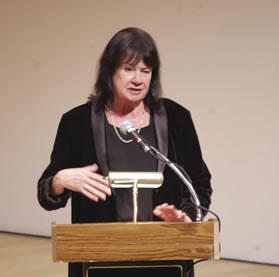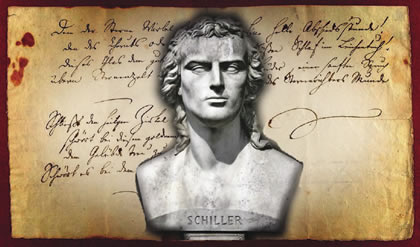SCHILLER INSTITUTE CONFERENCE
Building A World Land-Bridge:
Realizing Mankind's True Humanity
Thursday, April 7, 2016, 9:00am - 9:30pm
NEW YORK CITY
Panel III: Classical Culture: The Only Basis for a Dialogue of Civilization
Opening Address by Helga Zepp-LaRouche:
Change History by Ennobling Man

EIRNS/Stuart Lewis
Helga Zepp-LaRouche, participating in Panel I of the April 7 Schiller Institute Conference in New York City. |
Program and video
Invitation
A PDF version of this article appears in the April 22, 2016 issue of Executive Intelligence Review and is re-published here with permission.Dennis Speed: To introduce our opening remarks person, I'd like to quote something that some of you may have heard before, in part, from Percy Shelley's In Defense of Poetry:
"But poets, or those who imagine and express this indestructible order, are not only the authors of language and of music, of the dance, and architecture, and statuary, and painting: They are the institutors of laws, and the founders of civil society, and the inventors of the arts of life, and the teachers, who draw into a certain propinquity with the beautiful and the true that partial apprehension of the agencies of the invisible world which is called religion. Hence all original religions are allegorical, or susceptible of allegory, and, like Janus, have a double face of false and true. Poets, according to the circumstances of the age and nation in which they appeared, were called, in the earlier epochs of the world, legislators, or prophets: A poet essentially comprises and unites both these characters. . . ."
The Schiller Institute is named after a poet, and all of its actions are intended to be poetic, informed by the principles of poetry and the idea of Classical poetry. The person who took it upon herself to conduct a mission to impart that profound and impassioned idea of poetry to America in particular, and to the world in general, also founded the organization which has convened you here today. I'd like Helga LaRouche, founder of the Schiller Institute, to come and give us opening remarks.
Helga Zepp-LaRouche: Confucius wrote many important things about music and the relationship between music and the state. He said, if you want to judge the condition of a country, you should look at its music. Now, by that measurement, I think we in the West are in deep trouble.
So that is why the Schiller Institute has given the highest importance to Classical music, and Classical art in general. But in a society which is so divided-in which all the issues are so divisive, and people have so many opinions that you cannot find two people who agree on one point of any given issue-how do you get it back to truth-seeking? And, to seek the truth no matter what you do, no matter what you do, if it's music, if it's teaching, if it's science, if it's doing business, people should be truthful. Because only then are they really human beings.
The only areas where truth-seeking is truly possible without the deviation of being opinionated or just taking over the opinion of someone else-the media, your neighbors, whatever-the two areas where it is possible to seek the truth are natural science, because there you can discover principles which are universal, because when you discover them in Germany, they also function in China, or in the United States, so therefore, there is a criterion of truth. And the only other area where this applies fully, is Classical art. Because only in Classical art can you find principles which are as eternal and as truthful as scientific principles.
So the question therefore, is how do we get society back-healed-from the terrible condition in which it is right now?
Educate the Emotions
Well, we have to educate people again to know what beauty is. In Schiller's famous controversy with Kant, Kant said, in the categorical imperative, "you must." "You must be moral, you must act in such a way that you will not violate the rights of someone else. . . ." Schiller was horrified by this, and said, "Poor Kant! He must have had a terrible childhood, because he only wrote for slaves, for servants, and not for beautiful souls." The beautiful soul is one that loves freedom so much, that it does not even want to contemplate a procedure to force itself to be moral: That would mean suppressing something, and true freedom must not suppress.
And that is why the beauty in everything, especially in Classical art, is so absolutely crucial, because beauty is an expression of reason. Schiller demands that beauty be defined, not by experience, but by reason. But at the same time, beauty is also manifest naturally in the realm of the senses, and therefore, there is no contradiction between reason and emotions, in beautiful art and other expressions of beauty.

Bust of Friedrich Schiller on a manuscript of the “Ode to Joy”. |
Schiller was absolutely convinced that the most important task of his time was to educate the emotions. Because if people are emotionally crippled, so that they have only one faculty or skill, and have neglected all others, or if they have somehow mismanaged their whole life, the only remedy is through the education of the emotions, up to the point where your emotions guide you on the level of reason, so that you can blindly follow whatever your impulse is, because it is never against what reason would command.
Now Schiller called this "aesthetical education." And the way to achieve it is through great Classical art. He had much to say in the beautiful Aesthetical Letters as to why only great Classical art can bring about the moral improvement and ennoblement of the individual. He was convinced-and it has been my firm credo for a very long time-that change in politics cannot come through anything but through the ennoblement of the individual. So therefore, let's have some beautiful art, and understand that this is politics on the highest level.
